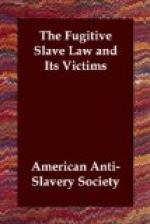Brown. She appeared greatly depressed and
dispirited. The little infant, Silla, was
carried by Pfc. Russell, the door-keeper of the
United States Court, and was crying violently.
Pollock, the reporter of the proceedings in the
United States Court, conducted another of the
fugitives, and all were safely lodged in the omnibus,
which drove down to the Covington ferry-boat; but,
although a large crowd followed it, no hootings
or other signs of excitement or disapprobation
were shown.
On arriving at the Kentucky shore, a large crowd was in attendance, which expressed its pleasure at the termination of the long proceedings in this city by triumphant shouts. The fugitives were escorted to the jail, where they were safely incarcerated, and the crowd moved off to the Magnolia Hotel, where several toasts were given and drank. The crowd outside were addressed from the balcony by H.H. Robinson, Esq., United States Marshal for the Southern District of Ohio, who declared that he had done his duty and no more, and that it was a pleasure to him to perform an act that added another link to the glorious chain that bound the Union. [What a Union! For what “glorious” purposes!]
Mr. Finnell, attorney
for the claimants, said he never loved
the Union so dearly
as now. It was proved to be a substantial
reality.
Judge Flinn also addressed
to the crowd one of his peculiar
orations; and was followed
by Mr. Gaines, owner of Margaret
and the children.
After hearty cheering the crowd dispersed.
Further to signalize their triumph, the slaveholders set on the Covington mob to attack Mr. Babb, reporter for one of the Cincinnati papers, on the charge of being an abolitionist, and that gentleman was knocked down, kicked, trampled on, and would undoubtedly have been murdered, but for the interference of some of the United States Deputy Marshals.
A legal irregularity
on the part of the Sheriff was brought
to the notice of Judge
Carter on the morning of February 29.
It was passed over lightly.
On the Sunday after the delivery of the slaves, they were visited in the Covington jail by Rev. P.C. Bassett, whose account of his interview, especially with Margaret, was published in the American Baptist, and may also be found in the National Antislavery Standard of March 15, 1850. Margaret confessed that she had killed the child. “I inquired,” says Mr. Bassett, “if she were not excited almost to madness when she committed the act! ‘No,’ she replied, ’I was as cool as I now am; and would much rather kill them at once, and thus end their sufferings, than have them taken back to slavery and be murdered by piece-meal.’ She then told the story of her wrongs. She spoke of her days of suffering, of her nights of unmitigated toil, while the bitter tears coursed their way down her cheeks.”




